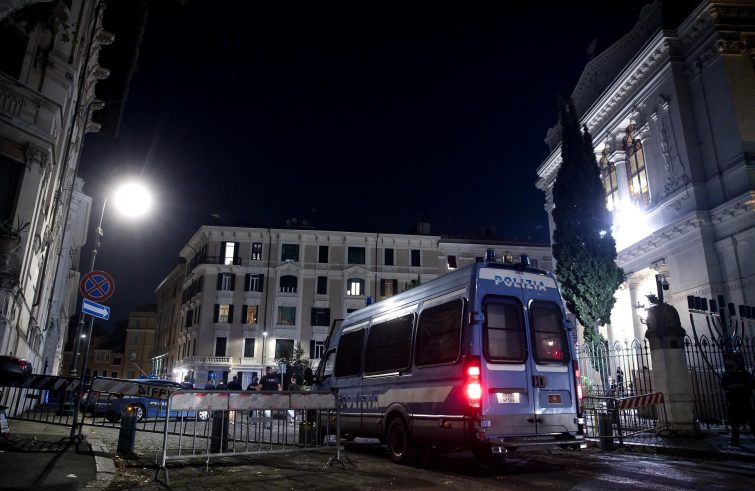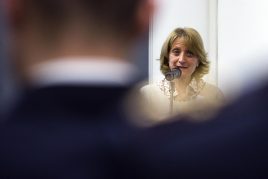
“Life goes on, life must go on. We will not succumb to terror. That’s what terror wants, to cause disruption and fear. We will not let that happen. That is why we will go on with our lives and we will not close the synagogues. Life is the most important thing. Of course, it does not depend on our will alone. It also depends on the extent to which other countries and international contexts recognise this. Israel’s right to live, to survive, to withstand this threat.” At the end of a very tense day, Noemi Di Segni, President of the Union of Jewish Communities in Italy (UCEI), was contacted by SIR to comment on the high alert in Italy for synagogues and Jewish community centres, while the war rages in Israel. Yesterday the Jewish communities celebrated the eighth day of Sukkoth, also known as Simchat Torah, the “Joy of the Torah”, which marks the end of the reading of the five books that make up the Torah.
President Di Segni, are Jewish communities in Italy on high alert?
There has been an alert, indicating a specific, targeted threat against all communities, which has led to increased surveillance by the internal security forces.

How will this alert affect religious life in the synagogues?
There is, of course, the need for strict compliance with the most rigorous precautions. But life goes on as it must, and it is only natural that the synagogues remain open on the Sabbath and yesterday for the holiday. With increased vigilance, of course. This applies to all of Italy.
Were there any particular incidents or did these two days go by without any problems?
Everything went smoothly. We would like to thank the police. It is not something to be taken for granted and when things go well, there is always someone who makes it happen. So many volunteers and so much professionalism.
What is the mood in your communities?
We are shocked, devastated. We are overwhelmed, shattered by the images we are seeing
We are in a state of utter shock at all the massacres of civilians and at the deportation of so many civilians to Gaza. Horrible images, dozens and dozens of babies, young women and old people being used as human shields and trophies. It’s horrifying. But at the same time there is a desire to end Israel’s isolation, to reaffirm Israel’s right to self-defence, to understand who it is we are fighting against. It is of vital importance that the world understands what we are up against and that it supports Israel’s inherent right to defend itself in a state of war. At all levels, without ifs or buts.
The Pope made an appeal to this effect at the Angelus prayer on Sunday. He said that war is always a defeat, for everyone. How important is the voice of Pope Francis and religious leaders?
His reference to the State of Israel was also very much appreciated. This is perhaps a novelty, to recognise that this is the entity, it is not just the Holy Land. It is the State of Israel. That is where this attack is taking place and it is against the State of Israel that the war is being waged. I think it’s very important for the religious world to come out and condemn this as strongly as possible.
This coming 16 October will mark the 80th anniversary of the Nazi raid on Rome’s Jewish ghetto. Sadly, this anniversary comes at a time when we have been plunged into a tragic war with images of deportations that we thought would be bound forever to our historical memories. What does this mean to you?
We will mark this anniversary in the knowledge that these are not just pages of history, that what happened in the past is still happening today, right here. It could not be more evident. So it will not just be a reminder to say never again.
On the contrary, we should say that history can repeat itself and that there are those who still want it to repeat itself. In different ways, with new technologies and circumstances that make it possible.
These are no longer pages of history to be studied and remembered. It is reality, the present situation. It is happening there, it will happen here.
You have become true experts in the importance of remembrance. What is the antidote to hate and war?
For us, the most important thing is to teach our children to love their fellow human beings from the day they are born. To be curious and appreciate the life we have and the freedoms we are given.
The cry of ‘never again’ so often uttered by religious leaders seems to have fallen on deaf ears.
It has become ‘unfortunately again’.
This war is expected to last a long time. What are your hopes?
First of all, we can pray, every minute and every second, that the war will claim the smallest number of victims and the least bloodshed.
But the world has its own powers and responsibilities. It can stop these massacres, denounce them, bring them before international courts and condemn their instrumental exploitation.
What is happening is not decided by the Palestinian people, it is supported by terrorist organisations. And, of course, Iran is to be condemned and nothing conceded. So there are many levels at which the international community can play its part. We will continue to pray to God to protect the young men, soldiers, volunteers and families involved in the defence of precious lives and every inch of Israel’s land in these desperate hours, and to bring healing to the thousands of wounded receiving medical treatment.












